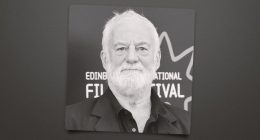
For his 2017 feature debut, Brit director Daniel Kokotajlo delved into his own personal experiences growing up as a member of the Jehovah’s Witnesses. Apostasy, a remarkable drama that opened a window into the strict Christian sect he had long since turned his back on, was celebrated as one of the most daring and powerful U.K. films of the year, landing a BAFTA nomination and five British Independent Film Award nominations.
For his follow up, Kokotajlo has headed into a distinctly more creepy and chilling direction. Starve Acre, which has its world premiere at the BFI London Film Festival on Oct. 12, is a gothic, folksy horror led by Brit stars Morfydd Clark, already a genre hero thanks to her breakout Saint Maud, and, in role like little he’s done before, Matt Smith. Based on the book by Andrew Michael Hurley and largely set in a remote farmhouse in 1970s England, the story follows a couple whose otherwise idyllic rural life is thrown into turmoil when their 5-year-old son starts acting out of character, a situation that brings the fore a folkloric myth concerning the land around their home, into which they unwittingly welcome sinister, supernatural forces.
Although the triumphantly eerie film may seen several worlds away from an exploration of religion, as Kokotajlo explains, there are strong connections between Starve Acre and Apostasy, especially surrounding the feelings of loss and helplessness.
Speaking to The Hollywood Reporter ahead of the premiere, Kokotajlo discusses how Starve Acre blends horror, gothic romance and even kitchen sink drama, leaving you in a place where “you never know the hell you are,” why Clark’s performance in Saint Maud left an “indelible mark” on him, and why, thanks to disillusionment with the present and future, folk horror is currently enjoying something of a cinematic moment.
How did you end up directing Starve Acre? Was it simply the case of reading the book and thinking, I really want to make this?
That was kind of it. I’ve been a big fan of Andrew’s work and we have similar preoccupations about land and the North (of England). We’re both see in the same way. You sort of sit in a field and stare out and see the darkness more than anything else. So we shared that. And that’s what I connected to in Starve Acre. It had that quality, but it also had something else. His other work about the land and how the past looms over, but then Starve Acre had this really neat symbolic element there about rebirth and springtime. So I saw all that as quite exciting and quite a challenge wondering how to shoot it.
Apostasy was a brilliant debut film and hugely well received. I’m sure there’s a lot of thought that goes into how you follow something like that, so what was the decision behind going in a more gothic horror direction?
I guess that’s my favourite genre. And it’s a place where you can deal with these kinds of themes as well. I wanted to tell a story about religion in a more of a spiritual sense. They are preoccupations of mine, ideas that I’m still working on, still processing. And especially this idea about loss and complete helplessness and how that affects the psyche. That’s something I dealt with in Apostasy. If you really boil it down they’re about very similar ideas. I guess Apostasy was more about helplessness and doubling down in faith and seeing how far people will go faith for whereas Starve Acre is about again loss and helplessness, but then what it would take for people to move on, or to accept a fate that they’ve been given. So on a thematic level it had the things that I love to explore. And I love being weirded out by cinema and creeped out. And obviously Starve Acre is not as personal to me, so that made it a little bit easier to deal with and therefore was more enjoyable to make. And it’s the kind of film I like to watch. I like something that blends different elements — it has elements of horror and then Gothic romance, but then also goes a bit kitchen sink and switches on you. You never know where the hell you are.
You’ve cast two of the most interesting and exciting British actors working today in Morfydd Clark and Matt Smith. Morfydd is brilliant in this and seem perfect for the genre. I understand you reached out to her directly for the role. Was this because of Saint Maud?
I think I had seen her in The Personal History of David Copperfield, but it wasn’t the same as seeing Saint Maud. Saint Maud was the first film I saw after COVID. I went into this massive cinema — there were only two other people there but it was this 300-seat cinema. And it was just an incredible experience to be watching somebody that was that engrossing. She left an indelible effect on me. Also some of the dialog in Saint Maud reminded me of what I was trying to do in Apostasy and looking at how far people take religion. So I connected with her on that level as well. I always had her in mind for this.
Was it the same for Matt Smith?
Yeah, as I was writing it, his face kept popping into my head. At the time I was watching a lot of old one-offs by Nigel Kneele (creator of iconic 1950s Brit sci-fi series Quatermass), and old M. R. James 1970s ghost stories. Quatermass was a precursor for the early Doctor Who stuff which was creepy and supernatural and I always thought there was a nice connection there with Matt. And I just love to shoot Matt. He’s got a great face. And a charisma that you can use in different ways. So I was excited by all that. And I felt like I’d not seen him in anything like this.
Matt is currently fronting a major advertising campaign for Paul Smith, so immediately after watching him in Starve Acre with long hair and living in the muddy countryside, I was seeing him on posters looking suave in designer suits. He’s definitely got a range.
Yeah, he’s got that attraction as well. I can see that. It’ll be interesting how people react to this and what they think of Matt in it. I think he’s done a great job. I’d work with either of them in a heartbeat.
I heard that the author Andrew came to the set. Did he watch some of the shoot and give it his blessing?
Yeah, he came right near the end of the shoot, because we we’re struggling with COVID and all that stuff so it wasn’t sensible to have people visit. But luckily he managed to turn up towards the end and yeah, I got his blessing. He approved. I remember him standing there, staring out across the field and he had a little wry smile that looked like ‘this is right, this is how I imagined it’. So I could tell straight away that he approved. He’s since seen the film and says he loves it and it works, which is a relief for me because the plot is similar to the book but some of the themes we’ve shifted slightly.
You said that this sort of gothic, folk horror was your favorite genre, but it’s also been having quiet a cinematic moment over the last few years. Do you have any thoughts as to why it’s become so popular?
I think it reflects the times in some way. Something about COVID and this sense of people going back home and returning to the land in some way. That’s something that connected with me. But then there’s something about becoming disillusioned with the present and the future, and then looking back and trying to become nostalgic about things. But then actually the past is ugly and dark and fucking unknowable. There’s something on that level that I think connects with people at the moment that’s created a boom in the macabre and gothic and folk storytelling.
Read More: World News | Entertainment News | Celeb News
HollyWood







